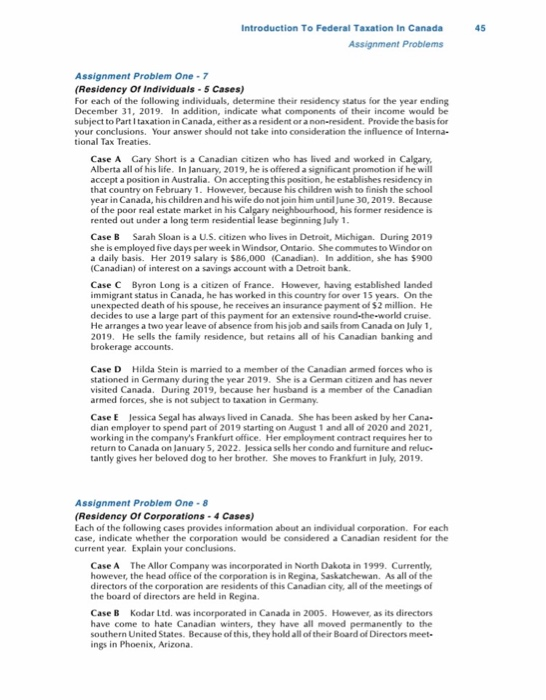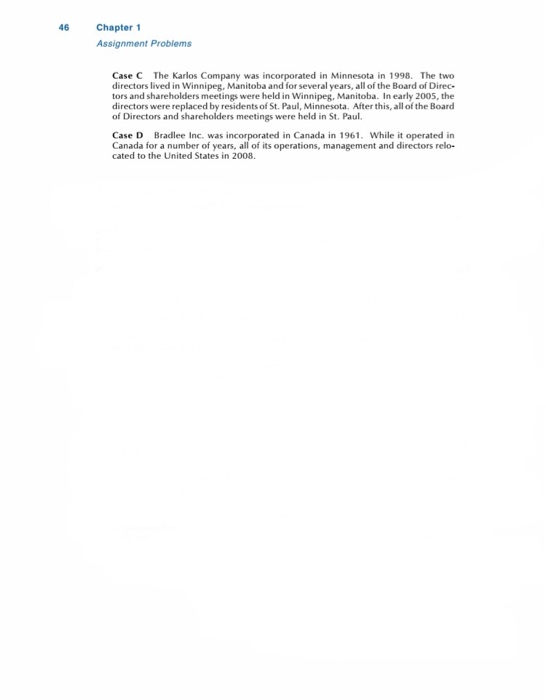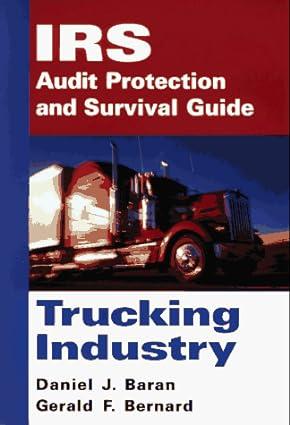45 Introduction To Federal Taxation in Canada Assignment Problems Assignment Problem One - 7 (Residency of Individuals - 5 Cases) For each of the following individuals, determine their residency status for the year ending December 31, 2019. In addition, indicate what components of their income would be subject to Part I taxation in Canada, either as a resident or a non-resident. Provide the basis for your conclusions. Your answer should not take into consideration the influence of Interna- tional Tax Treaties. Case A Cary Short is a Canadian citizen who has lived and worked in Calgary, Alberta all of his life. In January, 2019, he is offered a significant promotion if he will accept a position in Australia. On accepting this position, he establishes residency in that country on February 1. However, because his children wish to finish the school year in Canada, his children and his wife do not join him until June 30, 2019. Because of the poor real estate market in his Calgary neighbourhood, his former residence is rented out under a long term residential lease beginning July 1. Case B Sarah Sloan is a U.S. citizen who lives in Detroit, Michigan. During 2019 she is employed five days per week in Windsor, Ontario. She commutes to Windoron a daily basis. Her 2019 salary is $86,000 (Canadian). In addition, she has $900 (Canadian) of interest on a savings account with a Detroit bank. Case C Byron Long is a citizen of France. However, having established landed immigrant status in Canada, he has worked in this country for over 15 years. On the unexpected death of his spouse, he receives an insurance payment of $2 million. He decides to use a large part of this payment for an extensive round-the-world cruise. He arranges a two year leave of absence from his job and sails from Canada on July 1, 2019. He sells the family residence, but retains all of his Canadian banking and brokerage accounts. Case D Hilda Stein is married to a member of the Canadian armed forces who is stationed in Germany during the year 2019. She is a German citizen and has never visited Canada. During 2019, because her husband is a member of the Canadian armed forces, she is not subject to taxation in Germany Case E Jessica Segal has always lived in Canada. She has been asked by her Cana dian employer to spend part of 2019 starting on August 1 and all of 2020 and 2021, working in the company's Frankfurt office. Her employment contract requires her to return to Canada on January 5, 2022. Jessica sells her condo and furniture and reluc. tantly gives her beloved dog to her brother. She moves to Frankfurt in July, 2019. Assignment Problem One - 8 (Residency of Corporations - 4 Cases) Each of the following cases provides information about an individual corporation. For each case, indicate whether the corporation would be considered a Canadian resident for the current year. Explain your conclusions. Case A The Allor Company was incorporated in North Dakota in 1999. Currently, however, the head office of the corporation is in Regina, Saskatchewan. As all of the directors of the corporation are residents of this Canadian city, all of the meetings of the board of directors are held in Regina. Case B Kodar Ltd. was incorporated in Canada in 2005. However, as its directors have come to hate Canadian winters, they have all moved permanently to the southern United States. Because of this, they hold all of their Board of Directors meet- ings in Phoenix, Arizona 46 Chapter 1 Assignment Problems Case C The Karlos Company was incorporated in Minnesota in 1998. The two directors lived in Winnipeg, Manitoba and for several years, all of the Board of Direc- tors and shareholders meetings were held in Winnipeg, Manitoba. In early 2005, the directors were replaced by residents of St. Paul, Minnesota. After this, all of the Board of Directors and shareholders meetings were held in St. Paul. Case D Bradlee Inc. was incorporated in Canada in 1961. While it operated in Canada for a number of years, all of its operations, management and directors relo- cated to the United States in 2008








